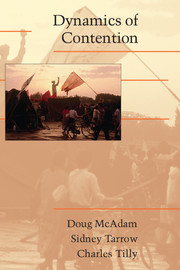Book contents
- Frontmatter
- Contents
- List of Figures and Tables
- Preface and Acknowledgments
- Abbreviations
- Part I What's the Problem?
- Part II Tentative Solutions
- Part III Applications and Conclusions
- 7 REVOLUTIONARY TRAJECTORIES
- 8 NATIONALISM, NATIONAL DISINTEGRATION, AND CONTENTION
- 9 CONTENTIOUS DEMOCRATIZATION
- 10 CONCLUSIONS
- References
- Index
10 - CONCLUSIONS
Published online by Cambridge University Press: 05 June 2012
- Frontmatter
- Contents
- List of Figures and Tables
- Preface and Acknowledgments
- Abbreviations
- Part I What's the Problem?
- Part II Tentative Solutions
- Part III Applications and Conclusions
- 7 REVOLUTIONARY TRAJECTORIES
- 8 NATIONALISM, NATIONAL DISINTEGRATION, AND CONTENTION
- 9 CONTENTIOUS DEMOCRATIZATION
- 10 CONCLUSIONS
- References
- Index
Summary
We have kept our promises – at least some of them. We have moved from the static standard agenda for the study of social movements, with its bias toward treating one actor at a time, mainly from the West, to a more dynamic and relational account of contentious politics within and across world regions. While drawing our main illustrations from episodes of transgression, we have highlighted the incessant interplay between contained and transgressive modes of contention. We have insisted on the uselessness of choosing among culturalist, rationalist, and structuralist approaches to contentious politics but adopted insights from all three where we found them helpful. We have presented a program of inquiry centered on detection of robust mechanisms and processes in contentious episodes.
We have also blurred established boundaries among actors, mobilization, and trajectories, finding that similar mechanisms and processes appear in all three. We have developed and illustrated our arguments by means of fifteen wildly divergent episodes, working hard to cross boundaries among ostensibly different types of contention – democratization, nationalism, social movements, revolutions, and so on – by identifying similar mechanisms and processes within them. We have, finally, avoided any claims to create a new general model for all contentious episodes or for particular families of contentious episodes.
Recall how the book has unfolded. Part I (Chapters 1–3) reviewed existing analyses of contentious actors/action, mobilization/demobilization, and trajectories, assessing strengths and weaknesses of prevailing approaches to various forms of contention.
- Type
- Chapter
- Information
- Dynamics of Contention , pp. 305 - 348Publisher: Cambridge University PressPrint publication year: 2001



